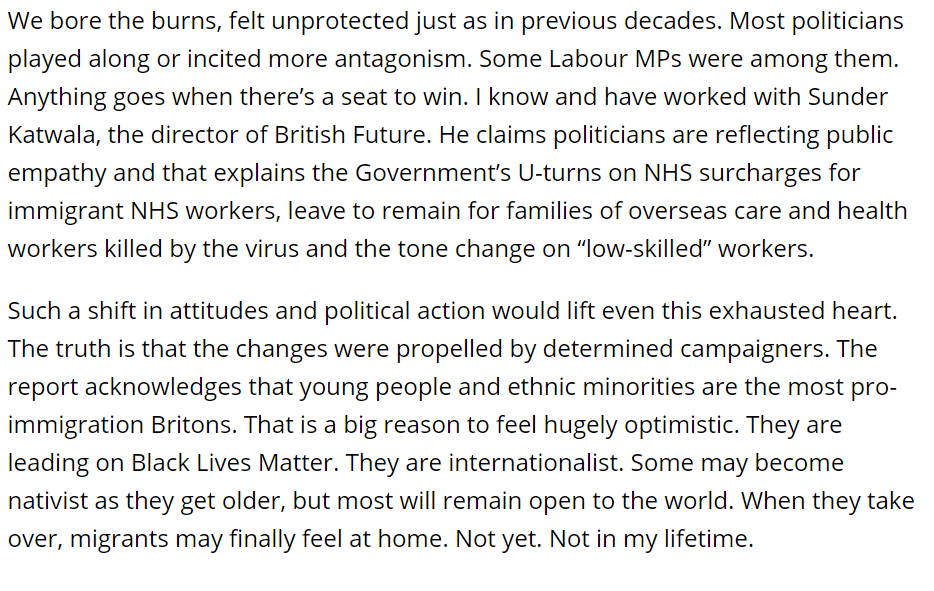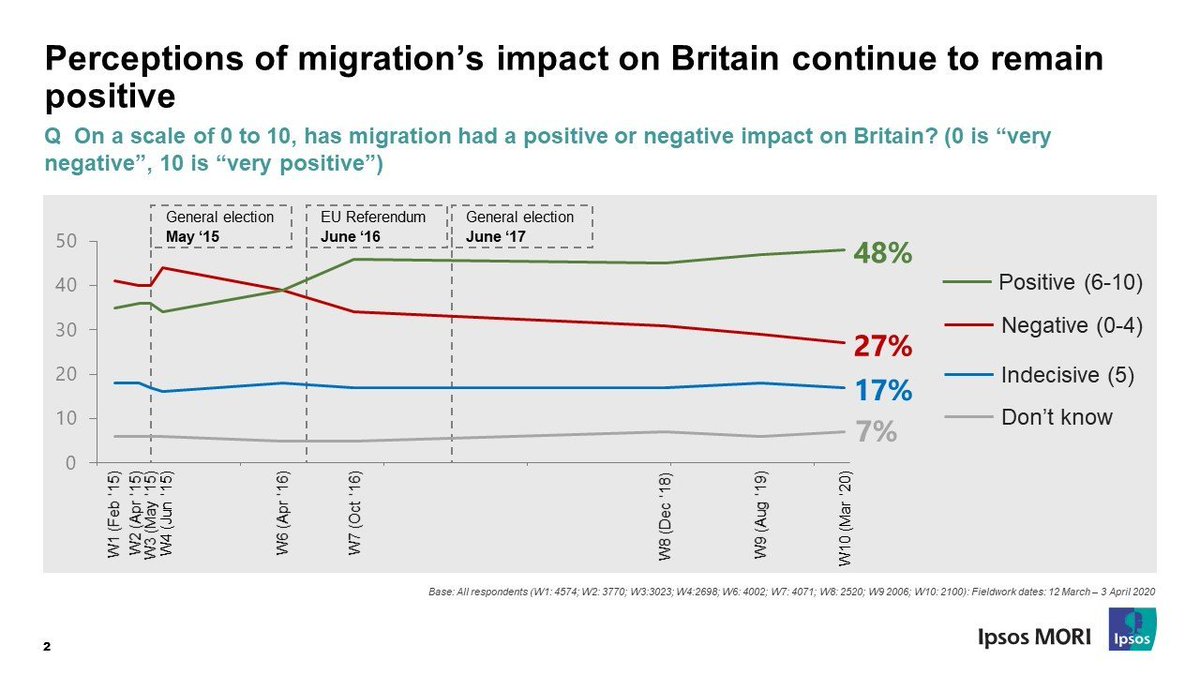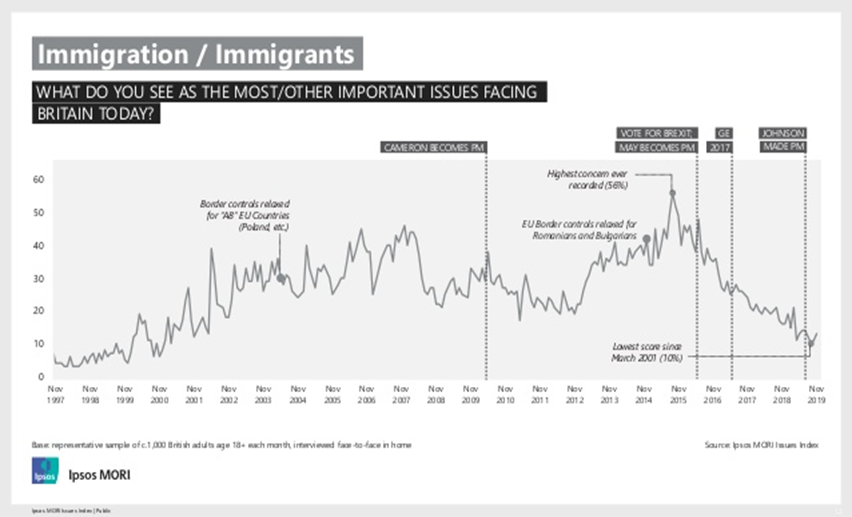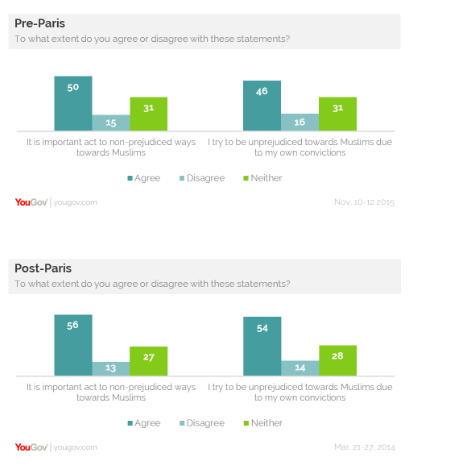My former colleague Yasmin Alibhai-Brown would be v.glad to see a + shift in attitudes to migration, but thinks the attitudes studies of the post-2016 shift are a myth (citing hostile emails and tweets as counter-evidence). https://twitter.com/y_alibhai/status/1275406934821257216
Yasmin does say that she is hugely positive about the shifts in attitudes among young people and ethnic minorities, shown in these studies, and about the efforts of campaigners to secure policy changes - such as on the NHS surcharge
Yasmin's column was responding to this i-paper report about tomorrow's @britishfuture and @policyatkings research.
Attitudes have changed on immigration - but over 4 years rather than 4 months https://twitter.com/britishfuture/status/1274982672033632258
Attitudes have changed on immigration - but over 4 years rather than 4 months https://twitter.com/britishfuture/status/1274982672033632258
A positive shift in immigration sentiment doesn't mean everybody is now pro-migration: no hostile emails and tweets.
Online debate is *much* more polarised: the loudest anti-voices (and the most vocal pro-voices) are amplified [yellow = online survey, blue = what public think]
Online debate is *much* more polarised: the loudest anti-voices (and the most vocal pro-voices) are amplified [yellow = online survey, blue = what public think]
Yasmin is right that campaigners pressed the government hard on the NHS surcharge and other issues. This succesful pressure on government, included by its own backbenchers, was certainly helped by these campaigns chiming very broadly with the public too https://twitter.com/policyatkings/status/1262413496924418049
Politicians have caught up with public views, where positive contribution is not measured solely by salary level
https://www.kcl.ac.uk/news/two-thirds-of-britons-value-low-skilled-workers-more-since-covid-19-crisis
https://www.kcl.ac.uk/news/two-thirds-of-britons-value-low-skilled-workers-more-since-covid-19-crisis
This graph of Ipsos-Mori tracker study of immigration attitudes over the last 5 years. The BSA shows similar trends, as do several other sources.
A significant number of people (1 in 4) are still negative, but immigration is less salient and attitudes are warmer, overall.
A significant number of people (1 in 4) are still negative, but immigration is less salient and attitudes are warmer, overall.
Yasmin worries that the Reading murders will cause a backlash, against Muslims, migrants and minorities. As well as being shocked and upset by the killings themselves, many people will share that concern. Clearly, some people seize on opportunities to meet hatred with hatred
We don't know the impact of that.
This study by @robfordmancs & @ProfSobolewska sought to research the scale of this type of 'backlash' effect (after the Paris terrorist attacks in 2015)
The results on that occasion were striking and counter-intuitive. https://yougov.co.uk/topics/politics/articles-reports/2015/12/23/after-paris-surprising-resilience-british-attitude
This study by @robfordmancs & @ProfSobolewska sought to research the scale of this type of 'backlash' effect (after the Paris terrorist attacks in 2015)
The results on that occasion were striking and counter-intuitive. https://yougov.co.uk/topics/politics/articles-reports/2015/12/23/after-paris-surprising-resilience-british-attitude
On that occasion, attitudes did not shift. People were a bit more motivated to avoid stereotyping Muslims as a group after that terror attack
(That's compatible with those already negative becoming more vocal/mobilised, eg increased online prejudice from the already prejudiced)
(That's compatible with those already negative becoming more vocal/mobilised, eg increased online prejudice from the already prejudiced)
If somebody does not think there has been any positive overall shift in public attitudes to migration, I can't really think of what type of further evidence they would accept to show whether there has/hasn't been a shift in overall public attitudes.
2 things can happen at once
Less salience, warmer attitudes, speeding up of long-term shifts (education, age, inter-ethnic contact)
*And* that those with the most toxic views stay loud, or get louder (even if not persuading others), maybe louder *because* they are shrinking.
Less salience, warmer attitudes, speeding up of long-term shifts (education, age, inter-ethnic contact)
*And* that those with the most toxic views stay loud, or get louder (even if not persuading others), maybe louder *because* they are shrinking.
Campaigners on most issues (eg, climate change, public spending, poverty, int development, education) tend to *highlight* public attitudes shifts in their direction; use these to push politicians to act.
It seems rarer to say 'good news is not true ... our opponents are winning'
It seems rarer to say 'good news is not true ... our opponents are winning'
Another (different) piece of consistent evidence https://twitter.com/sundersays/status/1257387466241253377
"Attitudes haven't changed on immigration"
"Attitudes got harder, not softer"
= Untrue
"Despite softening of atittudes, there's a lot to do on xenophobia and prejudice"
"Good to see/use + attitudes, eg NHS & social care, but tougher challenges on many other issues"
= Accurate
"Attitudes got harder, not softer"
= Untrue
"Despite softening of atittudes, there's a lot to do on xenophobia and prejudice"
"Good to see/use + attitudes, eg NHS & social care, but tougher challenges on many other issues"
= Accurate
Obviously, people unlikely to change their views of (say) NHS doctors & nurses
Attitudes to Muslims/asylum-seekers: sounds plausible
- I'm not sure a liberal tabloid jumping to this assumption is so much better than a different type of tabloid doing that https://twitter.com/y_alibhai/status/1275406934821257216
Attitudes to Muslims/asylum-seekers: sounds plausible
- I'm not sure a liberal tabloid jumping to this assumption is so much better than a different type of tabloid doing that https://twitter.com/y_alibhai/status/1275406934821257216

 Read on Twitter
Read on Twitter
![A positive shift in immigration sentiment doesn't mean everybody is now pro-migration: no hostile emails and tweets. Online debate is *much* more polarised: the loudest anti-voices (and the most vocal pro-voices) are amplified [yellow = online survey, blue = what public think] A positive shift in immigration sentiment doesn't mean everybody is now pro-migration: no hostile emails and tweets. Online debate is *much* more polarised: the loudest anti-voices (and the most vocal pro-voices) are amplified [yellow = online survey, blue = what public think]](https://pbs.twimg.com/media/EbOQNxrXsAIijBu.png)






